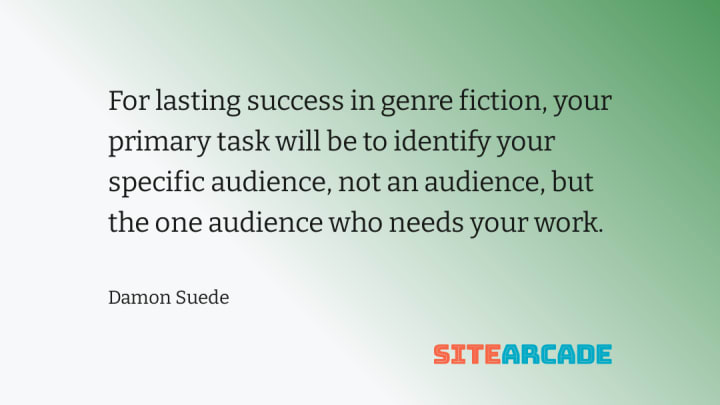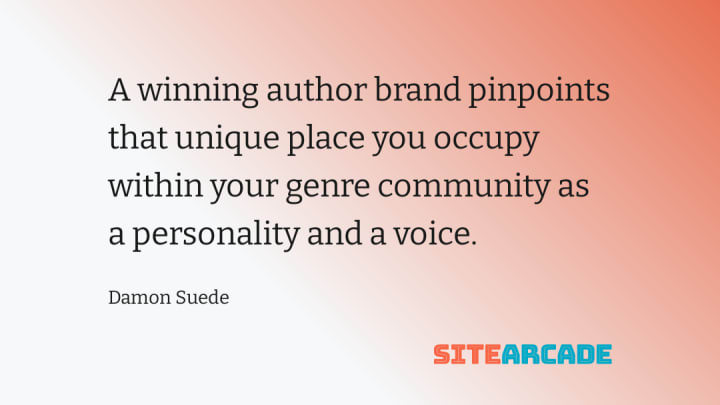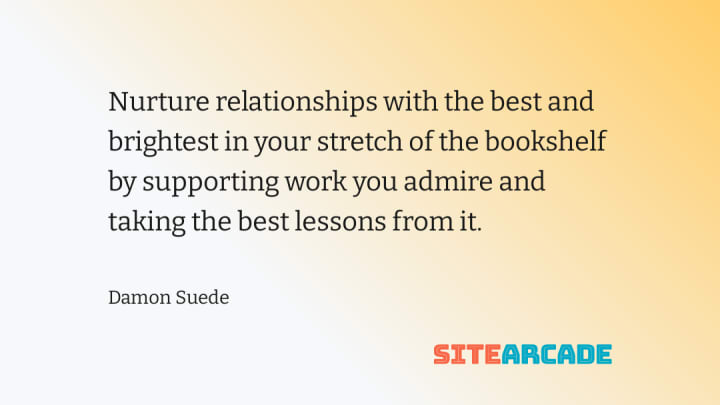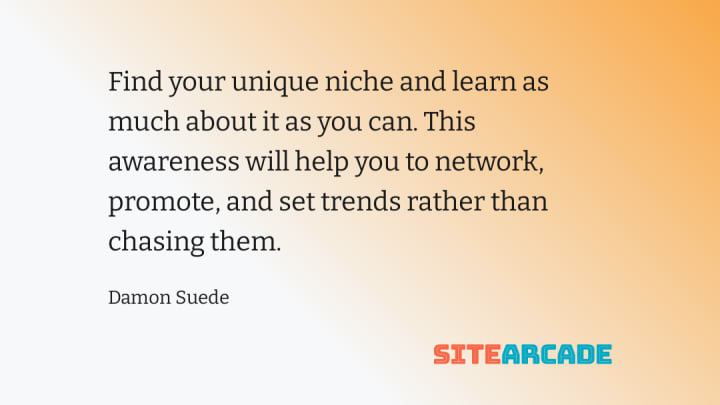Nailing Your Niche: How to Find Your Subgenre Fit
Where do you fit on the genre bookshelf?
We’re all writers, but our books, our voices, and our fan bases vary wildly. In our promotional efforts we need to stand out from our peers for the right reasons. Some authors specialize by subgenre, some by humor or intensity, others jump between every category on record and several that haven’t been invented yet. Whatever their approach, all authors face the task of clarifying why their books are extraordinary, so building your audience begins with establishing your place on the genre bookshelf: your niche.
As genre authors in the 21st-century, we face a strange problem. Everyone on the planet has access to any book they might enjoy, but the sheer volume of product makes it difficult for folks to pinpoint the right read even if they’re looking for it. Readers are drowning in dreck, so it’s never going to be enough for you to write a “good” book. To create a career, your signal has to rise above the noise.
Boosting Your Signal
Truth be told, genre is no longer enough of a unique signifier to count for much with fandoms or vendors. Market segmentation has become increasingly granular and dishonest tagging plagues all online transactions. When it comes to locating a story, genre (even subgenre) is a more like a country than a street address. Readers get lost on the way to the right book.
You can’t simply announce, “I write thrillers!” and expect the right audience to turn up when you launch a title. Does that mean domestic thrillers? Neo-Gothic? Revenge or heist? Medical or military or legal? How sexy or sweet? How violent? How comedic? How intense? Series or standalone? What about page count or chapter length? Fan expectations have gotten insanely specific. Modern entertainment has taught us all we can one-click precisely whatever we want and download it instantly. Even worse: predictive recommendations have changed everything; thanks to Amazon’s recommendations and Bookbub blasts, instant gratification has started to verge upon wish fulfillment before readers even have time to feel the urge.

For lasting success in genre fiction, your primary task will be to identify your specific audience, not an audience, but the one audience who needs your work: that unique population who is out there seeking your voice and vibe as a content creator because their taste and your talent go together like itch and scratch.
How can anyone find you if they never bother to look?
The Power of a Value Prop
This is where understanding your genre and its landscape will save you time and tears over and over. The more you know, the more you can grow. Start from the core question: what do you write that no one else can?
Author, know thyself!
Think of it like a value proposition. In corporate culture, a value prop is a statement which articulates precisely those strengths that make you stand out from your competitors so that the right customers can find you quickly and build an ongoing relationship with your business.
Get specific. Authors provide value as well, and no two authors, books, or careers are the same. Learn to communicate what makes you stand out to attract your audience and to help them spread the word effectively.
- What unique talents, skills, and background do you possess that characterize your work?
- What unique strengths do you have as an author?
- What unique emotional experiences do you provide in every single story?
- What specific subgroup within the genre fandom seek out the kinds of stories you write?
- How does your work honor, expand, and elevate your genre?
- How does your work improve the world and your reader’s lives? (yes, really.)
Think globally. Write you your value prop out as an actual statement in first person. “I am the only [insert genre] author who…”
To answer these questions properly, you’re going to need a bone-deep knowledge of the landscape you’re traversing; what works, what doesn’t, what sells, what smells… Bottom line: there’s never an excuse for ignorance or laziness. And the more you grok what your readers want and how the genre is developing, the more you become part of that organic process.
If you can state your value proposition clearly, you’ll not only attract the right readers, you’ll make it easy for them to spread the word on your behalf which will build a passionate fan base in a fraction of the time.
![Damon Suede Quote - Value prop Think globally. Write you your value prop out as an actual statement in first person. “I am the only [insert genre] author who…”](https://res.cloudinary.com/sitearcade/f_auto,c_limit,w_720,q_auto/v1622111533/blog%20articles/nailing%20niches/statement.png)
Occupying Your Niche
Essentially your niche is the stretch of the virtual bookshelf that your books fill perfectly and that your ideal audience and likely allies seek out instinctively. Genre publishing is above all things an industry that aims to meet and exceed expectations. Niche acts as the bedrock of every author brand, establishing the tone, topics, and terrain of your creative output.
For best results you should cultivate a niche in a section of the market you find inspiring and inviting. Fans and colleagues know when you put your heart into a book and when you’re phoning it in. It is the area of excellence specific to you. Nailing your niche requires significant research, intuition, and self-awareness. Stake out your turf on the genre shelf by communicating:
- Your knowledge of and affection for the niche.
- Your gravitational pull towards this niche and what inspires it.
- Your singular appeal to this particular niche.
- Your options for engaging the niche authentically.
- Your ability to claim a distinct space within the niche.
- Your value as a talented and trustworthy professional within the niche.
A winning author brand pinpoints that unique place you occupy within your genre community as a personality and a voice. It’s one thing to say you write paranormal, another to say you write vampires, and still something else to claim comedic middle-grade steampunk vampires as your turf.

If you’re already published, this pinpointing process should be relatively simple. What books does Amazon recommend alongside yours? What other authors are your fans obsessed with? What other stories come up in reviews of your work? Learn to place yourself in the flow of your chosen genre… Where you fit in and where you stand out.
If you aren’t published, you probably have less data but more freedom. Who are the authors you consistently admire no matter what they’re producing? What series do writing groups bring up whenever they critique something you’ve written? Which authors are your beta readers loyal to? There’s a place waiting in every genre for generous, talented authors willing to do the work. Get in where you fit in.
Niches Create Synergies
By articulating what you do best, you signal to readers, colleagues, and the media what they can expect from you, attracting the right kind of attention to your work from the folks who will find it most resonant. That’s a win–win–win for all parties involved. By default, your niche will reinforce your brand and attract similar folks into your professional orbit. No two authors are the same, but you have genre neighbors. These authors:
- Share a subgenre, tone, setting, or style with you.
- Appear regularly on genre panels with you at multiple cons and workshops.
- Get compared to you and your books, for good or ill.
- Will be recommended to folks buying your book online.
You’ll have to immerse yourself in the genre so you have a dynamic, flexible grasp of the tropes, traps, and tricks being implemented at this moment. How do they differ from the genre’s past? Where might they be headed next? Nurture relationships with the best and brightest in your stretch of the bookshelf by supporting work you admire and taking the best lessons from it. Cultivate curiosity and ask the kind of questions that inspire you and intrigue your fans.

Art is a conversation. As tastes and fandoms shift, artists extend their reach and develop fresh skills. Your niche needs you and your fellow authors to keep things healthy. Never assume everyone will play fair and pick up after themselves. Partnering with talented, diligent colleagues gives all parties concerned a stronger grasp on those fluctuations and a support system for the moments things get wonky.
Plus, niche allies can spark synergistic promo, because their fervent fans are likely to be yours as well. And far from competing for readers or poaching marketshare, cooperative promotion can improve readership for all concerned by boosting the best of your subgenre. By working together to keep your niche healthy, positive, and inclusive you encourage positive, polite engagement. Strategic cooperation will help the entire subgenre and strengthen best practices within your community.
Think of it like highway adoption programs: no one person can maintain the national freeway system, but you can insure that this stretch of road stays safe, litter free, and easy to drive so drivers don’t give it a wide berth. You also make it more likely that a casual drivebys might develop into a repeat visitor for this pretty patch.
Whether you write grimdark erotic thrillers about art theft or gentle right LGBT cozy mystery, partnering with fellow creators with similar tone/
Niches Celebrate Your Uniqueness
Claiming your niche needn’t pigeonhole you, but rather flags fertile terrain within the genre for your promo efforts. Likewise, drilling down into what you’ve written needn’t limit what you plan to write. If anything, conveying a clear sense of your niche allows you to expand your audience gradually and organically over the course of your career.
Obviously a tremendous challenge, but the only one that matters to any promo you do.
Find your unique niche and learn as much about it as you can. Besides gauging the market and zeitgeist, this awareness will help you to network, promote, and set trends rather than chasing them. You’ll learn which classic warhorse tropes keep ‘em in the saddle and sidestep the ones that have been beaten to death. Identifying your niche will help you collaborate with peers and distinguish yourself from them as well.
- Where do the members of this tribe gather and talk?
- Why and how are they drawn to these types of books?
- What other adjoining niches and subjects appeal to them?
- What do they crave and avoid? Who do they trust to recommend titles?
- How do you resemble and stand apart from your bookshelf neighbors?
- Anything perennial or overused? What are the warhorses and dead horses?

Remember: If you aren’t growing, you’re dying. There is no such thing as a static ecosystem. Your work, your voice, your themes, your skills will evolve. We call it creative flow for a reason. That means you need to revisit and reconsider all the above questions regularly to make sure you’re still getting the right word out about what you do.
As your niche expands and your career allows, you’ll annex additional areas of the genre, but first you need to face your base. What makes you special to them? Establish a basic measure of saturation and market access so that you can gauge when you’ve reached the next level in the industry.
Most importantly, knowing your niche gives you a ringside seat and friendly cohorts as your career unfolds, as markets expand and contract, as trends explode and implode…affording you a real-time snapshot of genre fiction that cannot be beat.